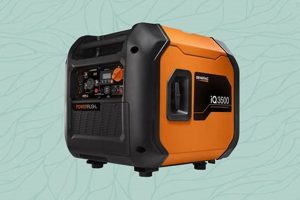
Compact, mobile power sources offer homeowners a convenient way to maintain essential electrical functions during outages caused by severe weather, grid failures, or planned maintenance. These devices, ranging in size and power... Read more »

A top-tier portable solar power station represents the pinnacle of off-grid energy solutions, offering a clean, quiet, and renewable power source for various applications. These devices typically combine high-capacity lithium-ion batteries with... Read more »

Portable generators typically use gasoline as fuel. Common gasoline grades, such as regular unleaded (87 octane) or mid-grade (89 octane), are suitable for most models. Using premium gasoline (91+ octane) generally offers... Read more »

A top-tier mobile power source fueled by gasoline offers a reliable solution for electricity needs outside traditional power grids. These units vary in power output, allowing consumers to select a model capable... Read more »

Selecting the correct lubricant for a portable generator is crucial for its performance and longevity. Using an inappropriate type can lead to increased engine wear, reduced efficiency, and even catastrophic failure. For... Read more »

Portable generators offer a versatile power solution for various situations, from camping trips and outdoor events to emergency home backup during power outages. Understanding their capabilities, limitations, and safe operation is essential... Read more »

Selecting a top-performing portable generator involves careful consideration of various factors, including power output, fuel type, runtime, noise level, and budget. For instance, a homeowner needing power for essential appliances during a... Read more »

A compact, independent power source, a portable generator typically utilizes gasoline, propane, or diesel fuel to produce electricity. This electrical output powers appliances, tools, and electronics, often during power outages or in... Read more »

Selecting a suitable generator for home use requires careful consideration of power needs. A generator capable of powering a typical residence must provide sufficient wattage to operate essential appliances and systems. For... Read more »

Finding the most suitable portable generator involves balancing power output, runtime, fuel efficiency, portability, features, and, crucially, cost. A generator representing optimal value isn’t necessarily the cheapest or most powerful, but rather... Read more »


